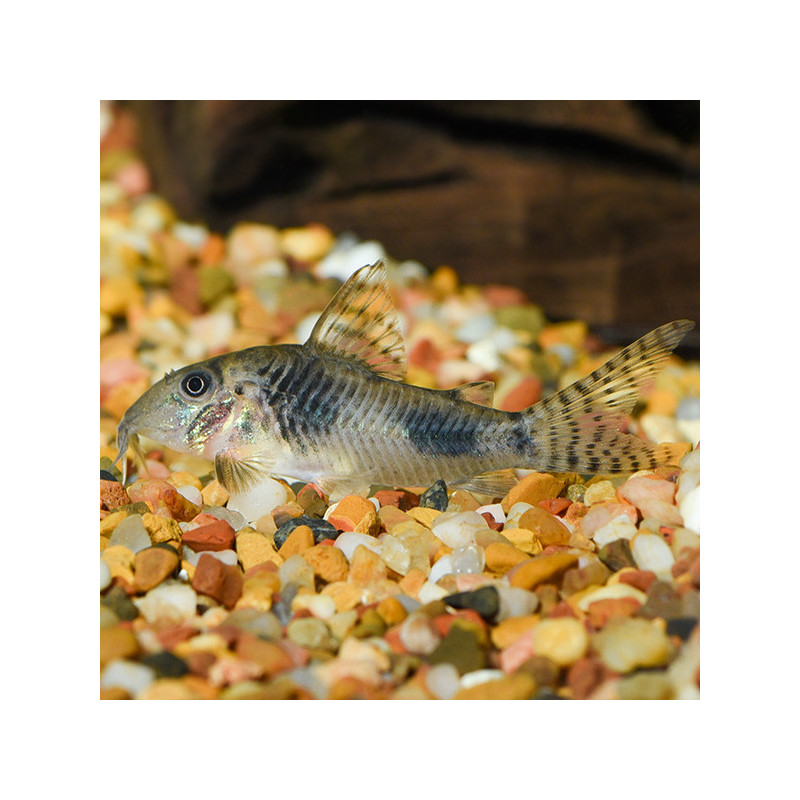Stocks Available
Albino Cory Catfish
SKU:128847
CORYDORAS AENEUS
1 INCH

Stock Available
Introduction: • Common Names: Ellis' Cory Catfish • Natural Habitat: Indigenous to the Amazon Basin in South America, typically found in slow-moving waters such as rivers and streams, often among sandy substrates with ample vegetation. Physical Characteristics: • Appearance: Recognized by its slender, elongated body, which features a light brown or tan coloration with distinctive dark spots or blotches along its sides. The barbels on its mouth are well-developed, aiding in foraging. • Size: Generally grows to about 2-2.5 inches (5-6.5 cm) in length. • Lifespan: Can live for approximately 5-10 years with appropriate care. Habitat Requirements: • Tank Size: A minimum of 20 gallons is recommended for a small group; larger tanks are ideal for better water quality and more swimming space. • Water Conditions: o Temperature: Prefers temperatures between 72-78°F (22-26°C). o pH: Optimal range is between 6.0 and 7.5. • Aquascaping: Use a soft substrate, such as sand, and provide hiding spots with plants, driftwood, and rocks to simulate their natural environment. Diet: • Primary Diet: Omnivorous; in their natural habitat, they feed on small invertebrates, plant material, and detritus. • Supplemental Feeding: In aquariums, provide high-quality sinking pellets, flake foods, and occasional treats like frozen or live foods such as brine shrimp and daphnia. • Feeding Frequency: Offer small amounts of food once or twice a day to meet their nutritional needs. Compatibility: • Temperament: Generally peaceful and sociable, making them suitable for community tanks. • Suitable Tank Mates: Compatible with other small, peaceful fish like tetras, rasboras, and guppies. Keeping them in groups of at least 4-6 enhances their social behavior. • Incompatibilities: Avoid aggressive fish species that may stress or harm the Corydoras. Care Level: • Difficulty: Considered easy to moderate; they adapt well to various water conditions, though stable water quality is crucial. • Health Monitoring: Regularly check for signs of illness, especially skin and fin issues. Maintain a clean environment to reduce disease risk. Breeding: • Breeding in Captivity: Breeding can be achieved under the right conditions; pairs may form and exhibit courtship behaviors. • Spawning: Egg layers; they typically deposit eggs on smooth surfaces, such as leaves or tank glass, and often protect them until they hatch. Economic Considerations: • Market Demand: Popular among freshwater aquarium enthusiasts due to their unique appearance and friendly nature. • Wholesale/Retail Pricing: Generally affordable, making them accessible for many hobbyists. Sustainability and Conservation: • Wild Population: Populations are generally stable, but habitat destruction poses potential risks. • Aquaculture Efforts: Successfully bred in captivity, helping to lessen the impact on wild populations. • Regulations: Compliance with local regulations regarding the trade of freshwater fish is essential. Conclusion: The Ellis' Cory Catfish is a delightful and engaging addition to community aquariums, cherished for its unique appearance and peaceful temperament. With proper care and attention to their specific needs, these fish can thrive, providing enjoyment and beauty to aquarium enthusiasts for years to come.
Data sheet
16 other products in the same category: